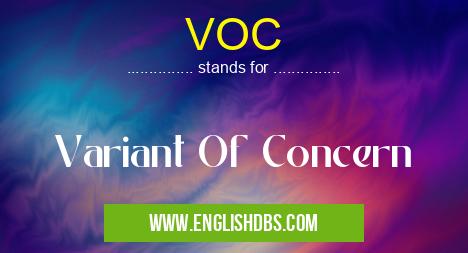What does VOC mean in BIOLOGY
Variant Of Concern (VOC) is a term used in science, specifically in the field of virology, to describe a specific strain or variant of a virus that is of particular concern and requires enhanced monitoring, investigation, and public health response. VOCs are typically characterized by specific genetic mutations or changes that confer certain advantages to the virus, such as increased transmissibility, virulence, or immune evasion.

VOC meaning in Biology in Academic & Science
VOC mostly used in an acronym Biology in Category Academic & Science that means Variant Of Concern
Shorthand: VOC,
Full Form: Variant Of Concern
For more information of "Variant Of Concern", see the section below.
Meaning of VOC
VOC stands for Variant Of Concern. This term is used to describe specific strains or variants of a virus that exhibit characteristics that make them a potential threat to public health. VOCs may have increased transmissibility, virulence, or immune evasion properties, requiring heightened surveillance and response measures.
Full Form of VOC
The full form of VOC is Variant Of Concern.
What does VOC stand for?
VOC stands for Variant Of Concern. It refers to a specific strain or variant of a virus that has undergone genetic mutations or changes that have raised concerns about its potential impact on public health. VOCs often have increased transmissibility, virulence, or immune evasion capabilities, warranting enhanced monitoring and response strategies.
Essential Questions and Answers on Variant Of Concern in "SCIENCE»BIOLOGY"
What is a VOC (Variant of Concern)?
A VOC is a variant of a virus that has undergone genetic changes that raise concern about its potential to cause more severe disease, spread more easily, or evade existing treatments or vaccines.
How do VOCs emerge?
VOCs emerge through the accumulation of mutations in the virus's genetic code. These mutations can confer new or enhanced properties to the virus, such as increased transmissibility or resistance to antiviral treatments.
Why are VOCs a concern?
VOCs can pose a significant threat because they have the potential to:
- Cause more severe disease or increase the risk of hospitalization and death
- Spread more easily, leading to wider outbreaks and increased transmission rates
- Reduce the effectiveness of existing vaccines and treatments
- Complicate pandemic control efforts
How are VOCs identified and tracked?
VOCs are identified through genomic sequencing, which determines the genetic makeup of the virus. Scientists and public health officials monitor sequence data to detect emerging VOCs and track their spread.
What measures can be taken to mitigate the impact of VOCs?
To mitigate the impact of VOCs, recommended measures include:
- Increased surveillance and testing to identify and track VOCs
- Enhanced infection control measures to prevent the spread of the virus
- Vaccination, as vaccines may provide some protection against VOCs
- Development and deployment of new vaccines and treatments specifically targeting VOCs
How can I stay informed about VOCs?
Stay informed about VOCs by following reputable sources of information, such as:
- World Health Organization (WHO)
- Centers for Disease Control and Prevention (CDC)
- National health authorities
- Trusted news outlets that provide accurate and up-to-date information
Final Words: VOCs are continuously monitored and evaluated by public health agencies and researchers to assess their potential impact on public health. The identification and timely response to VOCs are crucial for effective containment and mitigation efforts to prevent their spread and minimize their impact on communities.
